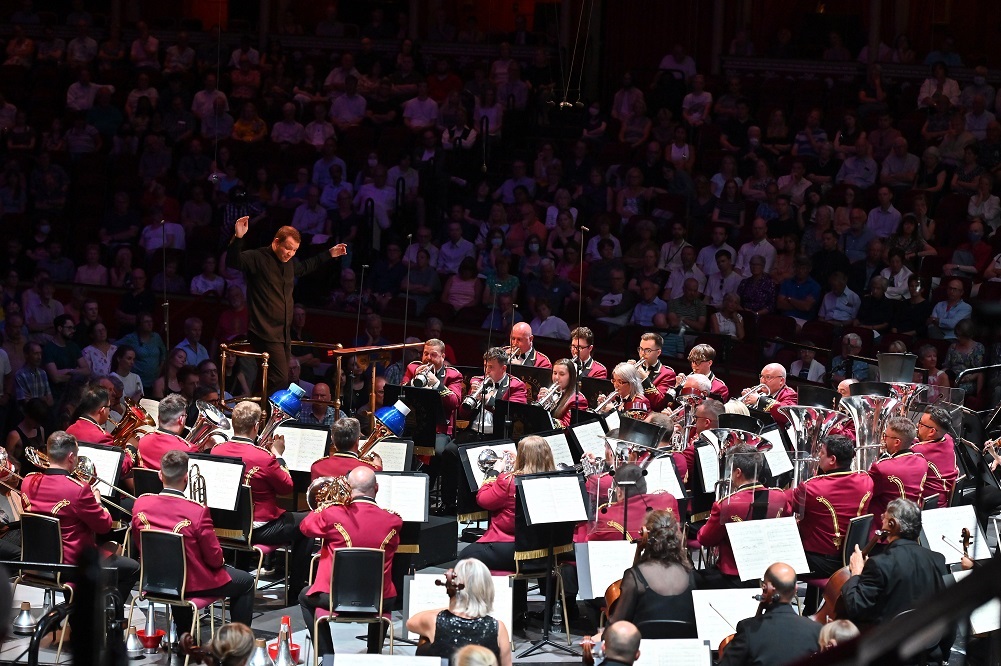
(Proms image: Mark Allan)

For the BBC National Orchestra of Wales final BBC Prom, Ryan Bancroft conducted two large-scale works.
Joined by Tredegar Band for the world premiere of Gavin Higgins' ‘Concerto Grosso for Brass Band and Orchestra’, they followed with Berlioz's ‘Symphonie Fantastique’.
Brass bands have not been a regular feature of the BBC Proms and one can posit various reasons ranging from class consciousness and banding's origins in working class industrial culture to the sheer fact that they are largely amateur.
I have a long enough memory to remember at least one occasion when a planned amateur band was replaced at the last minute by professional musicians. Hopefully attitudes are changing, with Tredegar also appearing at their own late-night concert.
Tredegar can trace its origins back to 1849 and was officially constituted in 1876. Gavin Higgins has a banding background too, growing up in a former mining area he both played and worked with bands before writing for them.
Social history and politics
His ‘Concerto Grosso’ was a large-scale five movement work that explored brass band history and style; mixing social history with music and a smidgeon of politics.
The form typically has a smaller group of soloists contrasted with a larger ensemble, but whilst there were (marginally) fewer in the band than there were in the orchestra, it was clear that in terms of volume, the two groups were well matched with plenty of moments when Higgins used this to have the band temporarily overwhelm the orchestra.
His orchestration focused on colour and timbre however, rather than sheer volume; the orchestra included double woodwind but featuring bass clarinet, cor anglais, piccolo and double bassoon, and there was also a small orchestral brass section, used at times as intriguing pre-cursors of the band, plus a large percussion section.
His orchestration focused on colour and timbre however, rather than sheer volume; the orchestra included double woodwind but featuring bass clarinet, cor anglais, piccolo and double bassoon, and there was also a small orchestral brass section, used at times as intriguing pre-cursors of the band, plus a large percussion section.
We began with ‘Island’ (mysteriously) - a lyric pastoral evocation of landscape, all evocative textures sometimes quite dense with solos emerging and dissolving, the band utilising different types of mute to bring our varieties of quiet textures.
Despite all the musicians being ‘hugger-mugger’ on stage, Higgins rather cleverly suggested an element of distance between his two groups. Whilst the music developed in energy for a period, finally the mists settled. This movement bled deftly into the second ‘Coal’ (mechanico), and of course coal is intimately linked to the origins of brass bands.
Here the mechanical writing for the orchestra, which featured some remarkable percussion sounds, brought memories of Alexander Mosolov's 1927 Soviet futurist piece, ‘The Iron Foundry’.
Dramatic interpretations
The band's contribution featured as dramatic interruptions to the orchestral regularity, and whilst there were loud moments, what fascinated was the range of quiet sounds that Higgins drew from his players.
‘Class’ (confidently) was fast and vivid with plenty of percussion and some bravura brass writing, both loud and quiet. Becoming more aggressive, the music finally evaporated.
An eerie cornet solo prefigured a sequence where different sections of the band had solos against the orchestral backdrop, creating a rather melancholy sound and again impressing with Higgins' sophisticated use of his large resources to quiet but remarkably highly coloured ends.
The final two movements moved away from banding's origins to band music itself.
‘Sentimental Music’ (espressivo) was slow and evocative with lots of rich harmonies.
An eerie cornet solo prefigured a sequence where different sections of the band had solos against the orchestral backdrop, creating a rather melancholy sound and again impressing with Higgins' sophisticated use of his large resources to quiet but remarkably highly coloured ends. We had an almost 'big tune' on the band before the climax evaporated.
The final movement ‘Contest Music’ (with driving energy) was full of virtuoso flourishes, with band flurries over busy orchestral texture and featuring some very spectacular fast playing from the band members.
Bravura playing
Throughout the piece, what impressed was that as well as superb individual contributions, the whole band delivered some vividly bravura playing. Whilst there were quietly lyrical moments in the movement, the end was sudden and brilliant.
Throughout, Ryan Bancroft kept deft control of his disparate forces and seemed to revel in the sheer varieties of timbre and texture that Higgins conjured.
Tredegar’s own musical director Ian Porthouse (playing cornet in the Concerto Grosso) led an encore, an arrangement by Higgins of a traditional Welsh song.
Throughout, Ryan Bancroft kept deft control of his disparate forces and seemed to revel in the sheer varieties of timbre and texture that Higgins conjured.
This is certainly a somewhat occasional piece, but it deserves future outings.
Symphonie Fantastique
After the interval the band disappeared, but the number of orchestral musicians increased.
It is worthwhile remembering that Berlioz' ‘Symphonie Fantastique’ premiered in 1830, just three years after Beethoven's death and that the revelation of Beethoven's symphonies was a big factor in Berlioz' development.
The explicit poetic background to the work (and the more lurid stories about Berlioz and Harriet Smithson) can rather overshadow the piece's symphonic underpinnings. Ryan Bancroft's approach had a clear sense of classical structure and discipline, whilst allowing plenty of space for rubato, impulsive gestures and lots of articulation.
His speeds inclined to the steady but allowing space for detail.
Expectation
We began with hesitant wisps of romance, the scoring finely transparent and throughout the first movement the various strands and wisps were delivered with clarity, yet the underlying structure was still clear.
The ball scene began with a remarkable sense of expectation, leading to those wonderful harp phrases (relished by the orchestra's four harpists). The waltz was completely delightful, with a wry sense of enjoyment and Bancroft whipped the players into great excitement at the end.
We began with hesitant wisps of romance, the scoring finely transparent and throughout the first movement the various strands and wisps were delivered with clarity, yet the underlying structure was still clear.
The cor anglais solo in the third movement was answered by an oboe player in the body of the hall, creating an eerily evocative effect, built on by the strong yet delicate string sound.
Supressed passion
Throughout the movement there was a sense of suppressed passion, and whilst Bancroft kept the music flowing beautifully, the spaciousness of his approach lent clarity to all the details.
The ‘March to the Scaffold’ was all suppressed excitement and contrasts between extremes. There was lots of crisp detail, but also a steady build in excitement. The ‘Dream of a Sabbath Night’ was more about vivid timbres and colours than lurid overdone orchestral gestures.
The bells were placed in the hall which meant that the introduction of the Dies irae was striking in its aural effect.
For all the outrageousness of the subject matter, this was a performance full of crisp detail and precise effects, calculated to have the right Romantic effect.
Robert Hugill
Robert Hugill runs the influential classical music blog Planet Hugill which covers classical music, news and live music previews with concert, opera and recording reviews.
Published with permission.
The original version of this review appeared at:
https://www.planethugill.com/2022/08/prom-30-gavin-higgins-concerto-grosso.html
Further reviews:
The Guardian:
Andrew Clements
4 stars
https://amp.theguardian.com/music/2022/aug/09/prom-30-tredegar-band-bbcnow-bancroft-gaving-higgins-review
The Times:
Rebecca Franks
3 stars
https://www.thetimes.co.uk/article/bbc-now-bancroft-review-an-invigorating-and-rare-brass-band-prom-zghcw72s5
Morning Star
Ben Lunn
5 stars
https://morningstaronline.co.uk/article/c/music-die-for
Nation Cymru:
Peter Collins
https://nation.cymru/culture/review-the-tredegar-band-joins-bbc-national-orchestra-of-wales-prom/









